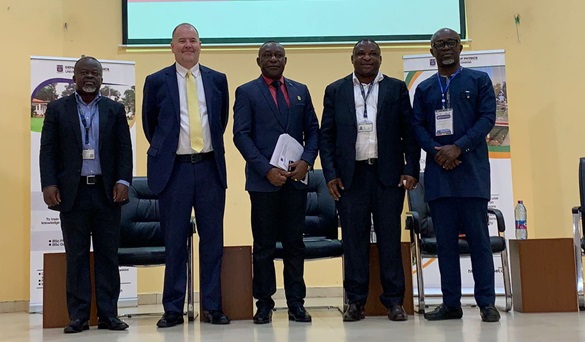Speakers at the programme
The University of Ghana (UG) has partnered Columbia University to commenced an air quality management certificate programme aimed at enhancing air quality management in West Africa.
The three year programme focuses on knowledge exchange, policy development, and innovative approaches to tackle air pollution and its health implications.
The training program is not limited to local participants, as it aims to train approximately 100 individuals annually.
Executive Director of the Environmental Protection Agency (EPA), Dr. Henry Kwabena Kokofu, speaking at the event emphasized the need for collective efforts to address air pollution in West Africa.
He said the training programme aligns with the EPA’s efforts to prevent and reduce air pollution through various interventions.
He stated, “air pollution has become a concern to both local and international communities, regulatory agencies, and research institutions among others.”
He said, according to the World Health Organisation, outdoor air pollution alone was responsible for an estimated 4.2 million premature deaths worldwide in 2019.
He further highlighted that in Ghana, more than 28,000 people die from exposure to air pollution annually.
The programme seeks to expose participants to new data collection and modeling techniques, particularly the use of low-cost sensors that provide accurate air quality data compared to traditional reference monitors.
This initiative is in line with the establishment of the Afri-SET Center at the university, which tests and evaluates the performance of different sensors in the Ghanaian and Sub-Saharan African environment.
Lead programme organiser, Professor Daniel Westervelt of Columbia University, said preliminary studies have identified open burning of waste, cooking with firewood and charcoal, and vehicle emissions as major contributors to air pollution in Accra and across the country.
He said open burning of trash in particular was cited as a major health hazard.
“There needs to be action taken, we need to do something about the air quality problem, you know, we have participants from local environmental protection agency, they can talk to their team and say, you know, we can we put into place some efforts that will reduce the amount of trash burning, which is really bad for human health,” he said.
Senior lecturer at the Department of Physics, University of Ghana, Dr. Allison Felix Hughes, highlighted the importance of the training program, stating, “This is about bringing practitioners from West Africa, especially from Ghana, together to train them on the issue of air pollution, which is a major global concern.”
The lecturer emphasized the significance of the AFRI-set Center and its role in evaluating sensors from various manufacturers.
He said the evaluation process, conducted over a 12-week period, will provide valuable insights into the performance of these sensors in Ghana’s specific environmental conditions.
He said the training programme also focuses on empowering participants to build low-cost sensors, which, when deployed across the country, can provide minute-by-minute information on air quality.
This real-time data will be instrumental in making informed decisions regarding location choices, public health concerns, and even housing prices.
He also disclosed that the programme also fosters collaboration with other West African countries, as evidenced by the presence of participants from five Anglophone-speaking nations.
With air pollution being recognized as a security issue, the training program includes media personnel, police, and other security agencies.
This comprehensive approach highlights the importance of addressing air pollution from various angles to safeguard public health and the environment.
By Nafisat Abdul Razak


